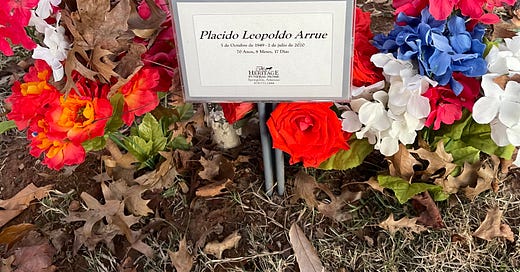14 months spent funding and publishing a story on meatpacking workers dying of COVID-19
The meatpacking industry lobbied Trump to declare its workers “essential,” to keep up production in the pandemic. Unless they got sick—then they were expendable.

I published “Their Lives on the Line” in The New York Review of Books this week with the support of the National Geographic Society. In late February 2020, shortly after the arrival of the pandemic, I applied to the National Geographic COVID-19 Fund for Journalists. I grew up in rural Arkansas, and I was aware that the labor practices of meatpacking companies like Tyson would put workers at risk during the pandemic. In July, I received the news that I had won the $8,000 grant. I included a budget to pay Arkansas photographer Liz Sanders in my grant. National Geographic supported my efforts to publish the story in Spanish “Sus vidas al filo de la línea.”
I began reporting in Arkansas in September 2020 and conducted interviews with workers through the end of 2020. During that time, I witnessed workers become infected with COVID-19, hospitalized with COVID-19, saw the impact on families where as many as ten members of the family were infected by a Tyson worker. I became infected with COVID-19.
As I recovered, I pitched the story to a dozen publications that ignored me. Workers sent me videos of working conditions with no social distancing. They sent me audio recordings of managers who told them to continue working despite being directly exposed to COVID-19. Tyson's public relations managers began to call my phone and insult me, saying essentially that I was going to write fake news. Workers continued to get sick and die. Publications ignored my pitches for a story about the need to vaccinated workers. And then I signed a contract with a publication that killed my story after two months of work. I stopped sleeping. I felt that I had failed workers. I passed through the longest period of insomnia of my life.
Then in April 2020, I pitched The New York Review of Books, and the editor responded immediately that he understood the difficulty of the work I was doing. Part of the challenge of the work was that all current workers requested to remain anonymous for fear of retaliation on the part of the company. I could only name the dead or ex-workers. The editor at The New York Review of Books understood the importance of publishing the story in Spanish so that workers would be able to read it.
After the story was published, I shared it with workers. Many of the workers attend evangelical churches in rural Arkansas. On one occasion, I attended church with some workers. In the women’s bathroom, I found a pile of stones painted with the words “SHE IS SUBMISSIVE.”
Despite witnessing many co-workers die of COVID-19, those who I interviewed told me they would not take the vaccine because their evangelical churches told them not to. “Not even the best scientist can do anything because humans aren’t doing what God wants,” said one evangelical worker who blamed the pandemic on such sins as homosexuality. Another worker texted me a message he had heard at church saying he wasn’t afraid of the virus because “I have the most powerful man in the world by my side - God.”
I’m still thinking of Ángela Pacheco whose husband Plácido Leopoldo Arrue died of COVID-19 after almost two decades of work at Tyson. While caring for him, ten members of his family became infected, including his wife.
The night that Mr. Arrue died in the hospital, his wife, who was in bed at their home, heard him call out to her. “The sun was coming up. He shouted three times to say goodbye to me. It was his last goodbye,” she said.
Mr. Arrue is survived by seven children and 16 grandchildren.
In memory of the dead workers, of all those who have died of COVID-19, may we all get vaccinated,
Alice



Superb reporting, Alice. Too many choose to ignore the fact of who is responsible for getting food to our table. Thankful that you are getting their story to the world.
Powerful piece Alice !!! Great work!